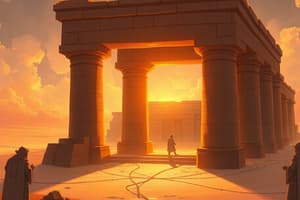Podcast
Questions and Answers
Who was considered the highest authority in Mesopotamian society?
Who was considered the highest authority in Mesopotamian society?
- The king (correct)
- The priests
- The merchants
- The aristocracy
Which group in Mesopotamia was primarily responsible for recording taxes and controlling product quality?
Which group in Mesopotamia was primarily responsible for recording taxes and controlling product quality?
- Merchants
- Scribes (correct)
- Peasants
- Craftspeople
What role did women typically have in Mesopotamian society?
What role did women typically have in Mesopotamian society?
- Priests with equal power to male priests
- Fully independent breadwinners
- Subject to a man's authority with limited work rights (correct)
- Servants in royal households
Which of the following deities was recognized as the god of the wind in Mesopotamian beliefs?
Which of the following deities was recognized as the god of the wind in Mesopotamian beliefs?
What primary economic activity did merchants engage in within Mesopotamia?
What primary economic activity did merchants engage in within Mesopotamia?
Flashcards
Who was the King?
Who was the King?
The highest priest and ruler in Mesopotamia, living in a grand palace.
Who were the Aristocrats?
Who were the Aristocrats?
A group of wealthy and influential people who owned land and held important positions in the government.
What did Scribes do?
What did Scribes do?
People who were skilled in reading, writing, and counting, responsible for record-keeping and overseeing production.
Who were Peasants?
Who were Peasants?
Signup and view all the flashcards
What were Mesopotamian beliefs?
What were Mesopotamian beliefs?
Signup and view all the flashcards
Signup and view all the flashcards
Study Notes
Mesopotamian Society
- A privileged minority comprised a small group, with high wealth and rights.
- The king held positions of both monarch and high priest, residing in the palace.
- Aristocrats, comprising the royal family and nobility, owned large estates.
- Priests led religious ceremonies, residing in temples with land holdings.
- Scribes served as officials, controlling product quality and recording taxes.
Rest of the Population
- The majority consisted of free or enslaved individuals.
- Peasants worked on land owned by the king or temples, receiving a portion of the harvest.
- Craftspeople produced goods like textiles, perfumes, wood, and metal in workshops.
- Merchants facilitated trade through river ports, bartering various goods like silver, copper, etc.
- Women were subordinate to men, expected to have children and needing permission for work, receiving half the pay of a male counterpart for the same work.
Mesopotamian Beliefs
- Mesopotamians practiced polytheism, believing in multiple gods.
- Anu was the sky god, Ishtar was the goddess of war and love, and Enlil was the wind god.
- Gods were perceived as powerful personalities, revealed through nature, dreams, or prophecies.
- Each city-state worshipped a patron deity, and ceremonies were held in their temples.
Studying That Suits You
Use AI to generate personalized quizzes and flashcards to suit your learning preferences.




